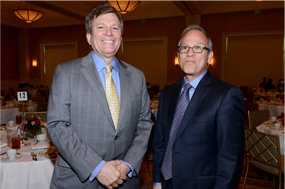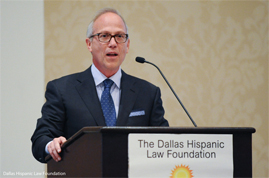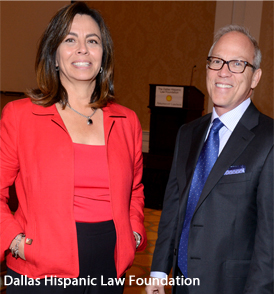© 2018 The Texas Lawbook.
By Mark Curriden
(April 2) – For John Torres, there was no inspirational story or significant life experience that led him to become a lawyer. There was no movie drama or soul-stimulating book that enticed him into the practice of law. There was no lawyer-relative who pushed him toward law school.
Instead, it was a series of thoughtful, logical choices based on an analysis of facts and his personal interests that guided Torres, the son of Mexican immigrants and a lifelong Chicago Cubs fan, to where he is today: the chief legal officer of Lennox International, a Richardson-based heating, air conditioning and refrigeration company that reported $3.84 billion in global revenues in 2017.
“No, there was no inspiring event,” Torres said in an exclusive interview with The Texas Lawbook. “Instead, it was more of a recognition that I love history, reading and writing, and those are key elements of being a lawyer.”

But those who know Torres well say that he possesses a second, equally important characteristic: an internal moral compass that has guided him to the pinnacle of the corporate legal profession.
“John is the gold standard for a corporate general counsel,” says T-Mobile Vice President of Legal Affairs Chris Luna. “John is liked by everyone. No one has a bad thing to say about him. He’s built a great legal department and has a great legal and business mind.
“John is an extraordinary role model for young lawyers of color,” Luna says.
This Tuesday, the Texas General Counsel Forum honors Torres with its prestigious Robert Dedman Award for Ethics and Professionalism. Past recipients include former AT&T GC Wayne Watts, Fluor CLO Carlos Hernandez and Hunt Consolidated CLO David Hernandez.

Photo courtesy of Dallas Hispanic Law Foundation
“I’ve witnessed John’s commitment to ethics first hand,” says Keith McDole, a shareholder at McDole Williams, a former general counsel at Occidental Chemical and a long-time friend of Torres. “He treats everyone equally, no matter if they are an executive or an associate at a law firm.”
Torres, who is 59, is a tremendous advocate of diversity in the legal profession and a revolutionary when it comes to eliminating the billable hour. He has handled multibillion-dollar M&A deals, including spinoffs, initial public offerings and taking a large public company private. He has taken more than 20 cases to trial, including large, complex commercial litigation matters.
Just three weeks ago, he was in Australia and Brazil leading Lennox’s legal efforts to sell its refrigeration portfolio for an estimated $110 million.
Torres’s biggest achievement, according to those who work with him, is the development of a corporate code of conduct and ethics for Lennox leaders and employees, which has become a global model for businesses.
“John knows true north,” says Lennox Deputy General Counsel Betty Ungerman, who has worked with Torres for nine years. “John is very straightforward. He never shades the facts. He looks at issues or problems with one question in mind: What is the right thing to do?”
Ungerman says “it was of paramount importance” to Torres that the code and policies “be written for a layperson to actually read and digest, not read and fall asleep from boredom.”
The result, she says, “our policies are short and concise, and written in short sentences.
Decisions, decisions
Born in the suburbs of Chicago, Torres was surrounded by success. His father and grandfather were physicians. His older brothers became doctors. The family members tremendously influenced his career path, though not in the way anyone would have thought.
Torres was a champion wrestler in high school and then chose to go to college at Notre Dame University.
“I chose the right university for the wrong reason,” he says. “I wanted to continue to wrestle in college. Instead, Notre Dame taught me leadership.”
Torres watched his brothers go through medical school and then their multi-year residencies before they were able to practice the medicine that they wanted. So, he chose the University of Chicago Law School.

After receiving his law degree in 1983, Torres moved to Phoenix, where he practiced commercial litigation and commercial real estate law for six years at Fennemore Craig. In 1989, he joined two other Fennemore lawyers who decided to exit the large, full-service law firm to start their own boutique.
“Some people shook their heads at my decision because I had been told that I would make partner the next year,” he says. “I simply wanted to exercise my entrepreneurial spirit and to be in charge of a law firm. And I had a desire for better compensation.”
The boutique grew from three to 11 lawyers over the next seven years.
Follow the satellites to Texas
In 1996, Torres represented Motorola in a complicated commercial lawsuit when one of the company’s in-house lawyers pulled him aside during lunch to tell him about an opening in the legal department.
“I loved commercial litigation, except for the discovery process,” he says. “The discovery process – depositions and answer interrogatories – is where I saw a lot of unprofessionalism among lawyers.”
Motorola assigned Torres to work with a team that launched satellites, which he found fascinating.
“Cell phones were in their infancy. There was no real Internet. The satellite phone system was more for text messaging,” he says.
Motorola moved Torres to Austin to be its lead lawyer for its semiconductor operation in 2000.
Four years later, the technology company executives tapped Torres to be the top in-house lawyer to lead a spinoff of its semiconductor unit through a public offering that raised $2.7 billion. The new company was called Freescale Semiconductors and Torres was made its first general counsel.
But in 2006, a handful of private equity firms, including TPG Capital, Blackstone and Carlyle, acquired Freescale for $17.6 billion, which was the largest private buyout of a technology company until the Dell buyout in 2013.

Photo courtesy of Dallas Hispanic Law Foundation
“It was a nice payday going private for a lot of folks,” Torres says. “Working for a company owned by private equity is different from a publicly-traded company. I prefer the GC job in a public setting. I like the securities law aspects of a publicly-traded company and the strategizing around quarterly reports and investor relations.
“It is easier to measure and understand the value and equity of a public company,” he says.
Lowest career point
Torres faced what he calls “the lowest moment” in his legal career in 2007 when a group of senior leaders at Freescale decided to claim that they had “good reason” to leave the newly structured company because they claimed that certain events triggered departure benefits in their agreements.
“It was difficult because these were colleagues and close friends,” he says. “But my loyalty and ethical responsibility were to the company. It was the lowest point of my career.”
New oppportunity at Lennox
In 2008, Lennox executives came calling.
“I enjoyed the opportunity to take what I had learned from my prior experiences and to build and grow a new legal department and to set a different tone and a different level of expectations,” Torres says.
During the past nine years, Torres has expanded the Lennox legal department to 10 lawyers. The company has continued to expand. As a result, executives have placed more duties and responsibilities on him. Torres now has corporate communications, public affairs, government affairs, real estate and trade compliance under his umbrella.
“There is no question that the scope and responsibilities of the corporate general counsel have grown over the past 20 years,” he says.
During his time at Lennox, Torres has led the legal department in six major M&A transactions and two major litigation battles, including a class action case and an intellectual property dispute.
“I love the tremendous variety of legal issues we face as a company,” he says. “In corporate transactional work, we are building something. In litigation, something is already broken and people are just fighting over it.”

Hilda Galvan, managing partner of the Jones Day office in Dallas, says that Torres is known for his integrity in dealing with others, his disciplined approach to the legal practice and mentoring others.
Torres is “disciplined in the way he assesses an issue confronting his company, develops a plan and then effectively and efficiently implements the plan to arrive at the best possible solution for the company,” says Galvan, who will introduce Torres at the Dedman Award dinner Tuesday evening.
Galvan says Torres is a “mentor to the lawyers with whom he works, especially those who report to him. He gives them opportunities; he challenges them; he gives them guidance.”
© 2018 The Texas Lawbook. Content of The Texas Lawbook is controlled and protected by specific licensing agreements with our subscribers and under federal copyright laws. Any distribution of this content without the consent of The Texas Lawbook is prohibited.
If you see any inaccuracy in any article in The Texas Lawbook, please contact us. Our goal is content that is 100% true and accurate. Thank you.
